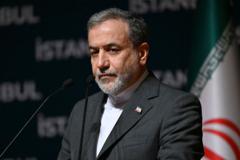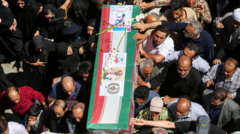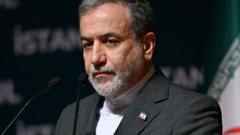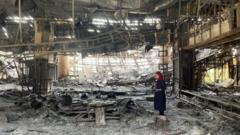Iran's Foreign Minister Abbas Araghchi has confirmed substantial harm inflicted on the nation’s nuclear infrastructure as a result of recent military strikes orchestrated by the United States and Israel. Speaking on state television, Araghchi described the damage as "excessive and serious" and indicated that assessments are underway by Iran's Atomic Energy Organisation. However, contrasting this admission, Supreme Leader Ayatollah Ali Khamenei asserted earlier that the strikes had failed to significantly disrupt Iran’s nuclear program, labeling the US President Donald Trump’s claims of total destruction as exaggerated.
**Iranian Official Acknowledges Significant Damage to Nuclear Facilities Amidst Tensions with US and Israel**

**Iranian Official Acknowledges Significant Damage to Nuclear Facilities Amidst Tensions with US and Israel**
Iran’s Foreign Minister reveals extensive damage to nuclear sites while leadership presents conflicting narratives about the impact and future of the country's nuclear ambition.
Khamenei's bravado suggests resilience, stating that the attacks have accomplished nothing significant, even as he has been largely unseen since the commencement of hostilities on June 13. In a notable shift in diplomatic posture, Araghchi declared that Iran has no intentions to resume nuclear negotiations with the US, abruptly halting a sixth round after Israel's military actions began. He emphasized that future diplomatic strategies will focus on Iran's national interests, though the details of such changes remain unclear.
The potential for renewed diplomatic engagement was highlighted by discussions within the Trump administration regarding a proposal to assist Iran in establishing a civilian nuclear energy program while easing sanctions, potentially injecting $30 billion into the effort. However, Iran's recent legislative actions to curtail cooperation with the International Atomic Energy Agency (IAEA) could complicate these overtures.
Israel justifies its military actions by asserting a need to impede Iran's ambitions of developing nuclear weapons, a claim Tehran has consistently denied, maintaining that its nuclear pursuits are strictly for civilian applications. The US intervention, which marked a significant escalation in the conflict, reportedly inflicted cumulative strikes on critical facilities such as Fordo, Natanz, and Isfahan.
As reports circulated regarding the extent of the damage inflicted on these nuclear sites, a leaked Pentagon assessment provided a more tempered view, claiming that the strikes would only delay Iran's nuclear program by months rather than years—a perspective that the current US administration has contested. The toll from the conflict has led to significant casualties, with Iran reporting over 600 deaths from the strikes, while Israeli fatalities were notably lower.
In the wake of these tumultuous developments, Iran's populace grapples with both physical destruction and psychological upheaval, reflecting a nation facing the complexities of international conflict and internal diplomatic recalibrations.
The potential for renewed diplomatic engagement was highlighted by discussions within the Trump administration regarding a proposal to assist Iran in establishing a civilian nuclear energy program while easing sanctions, potentially injecting $30 billion into the effort. However, Iran's recent legislative actions to curtail cooperation with the International Atomic Energy Agency (IAEA) could complicate these overtures.
Israel justifies its military actions by asserting a need to impede Iran's ambitions of developing nuclear weapons, a claim Tehran has consistently denied, maintaining that its nuclear pursuits are strictly for civilian applications. The US intervention, which marked a significant escalation in the conflict, reportedly inflicted cumulative strikes on critical facilities such as Fordo, Natanz, and Isfahan.
As reports circulated regarding the extent of the damage inflicted on these nuclear sites, a leaked Pentagon assessment provided a more tempered view, claiming that the strikes would only delay Iran's nuclear program by months rather than years—a perspective that the current US administration has contested. The toll from the conflict has led to significant casualties, with Iran reporting over 600 deaths from the strikes, while Israeli fatalities were notably lower.
In the wake of these tumultuous developments, Iran's populace grapples with both physical destruction and psychological upheaval, reflecting a nation facing the complexities of international conflict and internal diplomatic recalibrations.





















